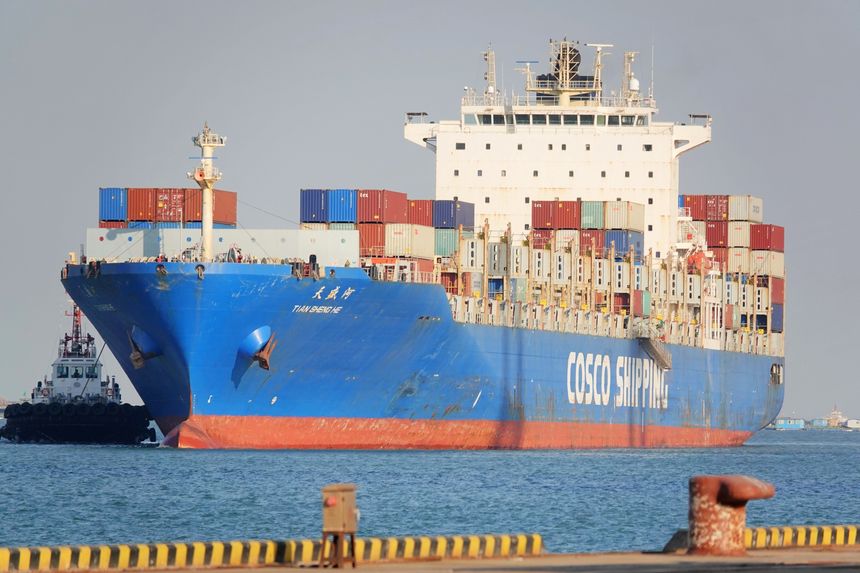
A Cosco Shipping container ship prepares to dock at Yantai, China, Dec. 29, 2022.
Photo:
Cfoto/Zuma Press
A shipping company with deep ties to Chinese state-owned companies purchased container terminals in New York and New Jersey in December, raising serious questions about the ability and willingness of the West to counter China’s strategic capability. China’s growing maritime commercial logistics empire poses a direct threat to the liberal international order. Beijing is building a platform for control of oceanic commerce and an amphibious invasion force that is extending the frontier of Chinese Communist Party influence to U.S. shores.
The consolidation of the global container-shipping industry into three alliances in 2016 opened the door for a new type of global organization operating largely beyond the reach of national regulators. Shipping companies formed the alliances to manage cargo capacity after price cutting led to the bankruptcy of a major shipping line in 2016. Alliance regulations bar shipping lines from fixing prices but allow them significant leeway to buy terminals and inland logistics assets. Operationally, alliance members often concentrate container service at alliance-owned terminals, which can make ports more dependent on a dominant alliance.
China controls one of the shipping alliances. The Ocean Alliance is dominated by Cosco Shipping, a Chinese state-owned company that is the world’s second-largest operator of ports—and is ultimately accountable to the Communist Party. The other members of the Ocean Alliance are Taiwan-based Evergreen Line and CMA CGM, a family-owned company based in Marseille, France, with deep ties to Chinese state-owned companies.
Cosco and other Chinese state-owned port and shipping companies have been steadily expanding their holdings in the West since 2000. By some analysts’ count, Chinese companies own or operate terminals in 96 ports in 53 countries. But it is the relative handful of terminals Chinese state-owned companies control in ports serving major population centers in the West that creates the greatest exposure to Chinese leverage.
Control of ports and terminals gives China economic and political influence over host-country governments where Chinese state-owned enterprises operate critical infrastructure. The contracts are even referred to as “concessions,” aptly implying that Western governments accept the superior containerized logistics capabilities that the Chinese companies have developed since acquiring the American technology in the late 1970s.
The newest salvo in China’s maritime commercial expansion came on Dec. 7, when CMA CGM said it is buying container terminals in New York and New Jersey. Most of the scant mainstream news coverage failed to note CMA CGM’s significant financial and operational links with Chinese state-owned companies. In 2013, CMA CGM sold 49% of its own terminal subsidiary to
China Merchants Holdings (International).
In 2015 the Export-Import Bank of China extended to CMA CGM $1 billion in financing to buy ships from Chinese shipyards. That funding has helped CMA CGM become one of the largest logistics enterprises in the world, with commanding positions in the supply chains for automotive parts and electronics. Satellite photos of Chinese shipyards show CMA CGM’s newest liquid-natural-gas-powered vessels being built alongside Chinese aircraft carriers.
Through the Maritime Security Program, the U.S. Transportation Department maintains a fleet of privately owned vessels intended to provide shipping for national-security purposes. This fleet includes seven vessels operated by container-shipping company APL, which CMA CGM acquired in 2016. In 2021 the Transportation Department approved replacement of an eighth APL vessel with one from CMA CGM.
U.S. allies including Greece, Canada, Germany and Israel have turned to Cosco and other Chinese state-owned shipping companies to invest in their terminals or build entire ports, sometimes over strenuous objections from Washington. Singapore and France are dependent on Chinese container volume or have national-champion companies that are business partners with the Chinese companies. If the bellicose rhetoric about imminent naval war with China leads to combat in the Western Pacific, prompting China to allow only Ocean Alliance vessels access to its ports, will those countries risk being cut off from Asian supply lines to side with the U.S.? A cold-eyed appraisal of the logistical situation suggests that’s a long shot.
Adm. Raymond Spruance, who helped devise the island-hopping strategy the U.S. used in the Pacific Theater during World War II—and then carried out the plan as commander of Fifth Fleet—wrote that a sound logistics plan determines the success or failure of military operations. The Chinese have such a plan for their economic campaign against America and the West. At the moment, the U.S. has nothing.
Mr. O’Dea is an adjunct fellow at the Hudson Institute and author of a forthcoming book, “Ships of State: The Maritime Logistics Foundations of the New Chinese Empire.”
Copyright ©2022 Dow Jones & Company, Inc. All Rights Reserved. 87990cbe856818d5eddac44c7b1cdeb8









